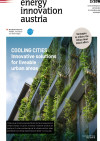Publications
There are 245 results.
Architecturally Diverse, Energetic Renewal

Post War Modernist Buildings Under Monument Protection. A Comparative Analysis of Energy Efficient Renewal Case study: Open Air School Franklinstrasse, Wien 21
S-House: Planning and Building for the future

The S-House is a two-storey straw-bale passive solar design. The building shell demonstrates the potential of straw-bale building and shows the whole spectrum of technical solutions for competitive components made of renewable resources.
Timber construction for high-density housing

Development of technical and economical solutions for high-density housing in timber construction under consideration of future regulatory developments (case study of a 5-story housing complex in Vienna).
RTI strategy for the bio-based industries in Austria

Sustainable industrial concepts will assume a key role in the future. At the European level, the development of bio-based industries and the use of bio-based products will be promoted.
Einfach:wohnen, Phase Construction

Support for the erection of the demonstrative housing project consisting of 7 houses (5 Low energy houses, 1 passive house and 1 "next to passive house")
Reconstruction ecological Freihof Sulz

integral reconstruction of the valuable cultural heritage "Freihof Sulz" to a communication- and action centre; Demonstration project for local culture and life quality, old building techniques, energy saving and ecological reconstruction."
Wall systems made of renewable resources

Testing and optimising post and beam straw bale constructions Testing the thermal insulation (specific heat conductance) and fire resistance of a construction (combustibility grading period), optimisation of building junction elements, development of a mobile testing lab for efficient and effective quality management
Documentary on 3sat "The future of living"

Production of a 45 minutes film about living in the future.
Facade Integrated Solar Collectors

Within the framework of this project system-, structural- as well as building physical basis theories should be elaborated, which will serve as a basis for constructional and aesthetically attractive solutions for the production of facade integrated solar collectors without thermal separation. The recyclability of the materials used and resource efficiency play a central role when it comes to the development of constructional solutions.
Solar Combisystems - IEA SHC Task 26

Documentation, comparison and optimisation of solar combisystems for domestic hot water preparation and space heating in the framework of an IEA research project
Innovative Refurbishment of Single Family Houses

Evaluation of best-practice models and recommendations to support dissemination
Cooling Citites

Innovative solutions for liveable urban areas
energy innovation austria
2/2019
Publisher: BMVIT und Klima- und Energiefonds
English, 12 pages
Publication Downloads
homeVALUE

The ecology and economy of housing. An assessment system for the evaluation of the suitability of buildings and housing estates for the future.
Linking Low Carbon Technologies with Low Carbon Society

The project „Linking Low Carbon Technologies with Low Carbon Society“ was conducted on behalf of the Federal Ministry of Transport, Innovation and Technology. In the course of the project a number of recent empirical studies on rebound effects were analysed. Based on this comprehensive analysis an overview of strategies for rebound management was compiled and policy recommendations for the technology sector were developed.
Technology and Innovation Roadmap "BioHeating and Cooling"

The Roadmap links with the energy research strategy of the Austrian Council for Research. It was developped together with national stakeholders from industry to deduct recommendations for policy makers. It includes clear suggestions for research topics until 2020 and provides an outlook on the contribution of biomass to the heating sector of a decarbonised energy system in 2050.
Solar energy - a significant economic factor

Major goals of this study were determination of the number of jobs provided in the thermal solar energy sector, the added economic value created in this sector and the predicted effects of achieving the goals, in order to better evaluate the economic significance of the use of thermal solar energy.
Sanierung PRO!

The goal of the project is the development of a guideline, which supports builders and planners or consultants in the organization and monitoring of inhabitant integration into the reorganization processes of multi-storey housing.
home dreams

Listening to the inhabitants of innovative buildings and using their satisfactory and unsatisfactory experiences as the basis for drawing up practice based criteria and recommendations for a quality, user-orientated building policy. The target groups are funding bodies, building contractors and town planners.
Cooperative Refurbishment

Models for participation of owners and tenants in ecological refurbishment of multi floor buildings
